- info@ficci.org.bd
- |
- +880248814801, +880248814802
- Contact Us
- |
- Become a Member
- |
- |
- |
- |
- |
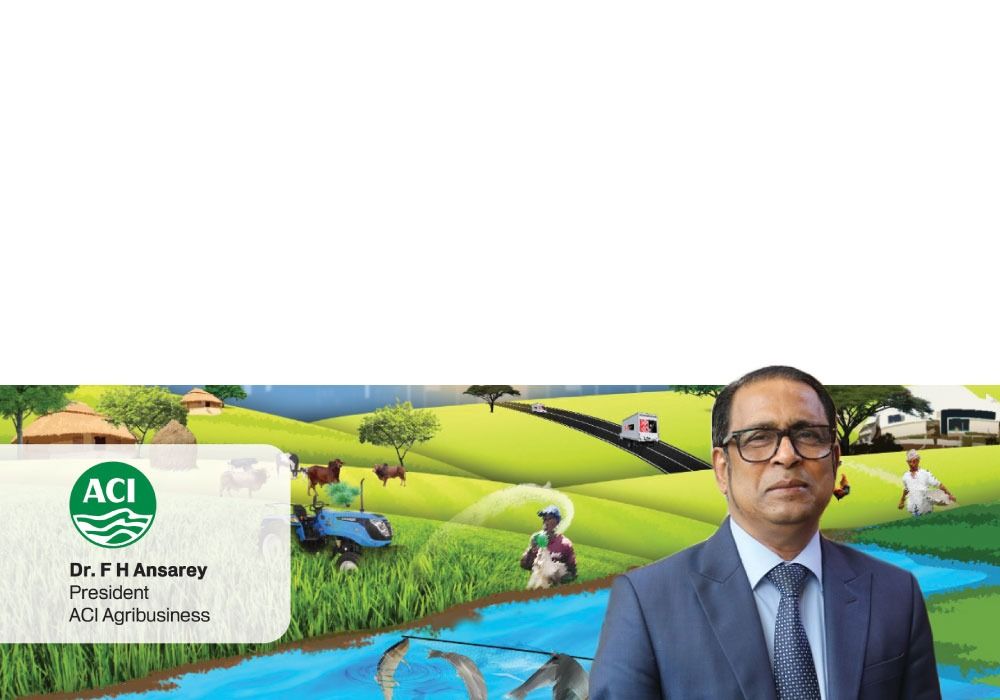
Agribusiness comprises all commercial agricultural operations, including growing crops, raising livestock, and producing agri-inputs including machinery, seeds, and fertilizer. It also includes transforming raw materials into finished products, marketing and distributing them, and offering additional services like technology and funding. Through the integration of agriculture and business, agribusiness contributes significantly to global food security by promoting economic growth, sustainability, and productivity.
Bangladesh's agribusiness sector is poised for exceptional growth and this growth is driven by a large and youthful population of 174.4 million, a rising per capita income, and a growing workforce70% of whom are under 40. Additionally, the country's expanding digital landscape, with 52.9 million social media users in early 2024, provides access to a regional consumer base of 3 billion. With over 2.3 million professionals entering the workforce annually, including 3,500 agriculture graduates, Bangladesh is strengthening its economic connectivity through the bridging of rural and urban communities.
Agriculture, the backbone of the nation's economy, engages 43% of the workforce and is expected to contribute a substantial 3,654 billion BDT to the GDP by 2024. The sector offers immense potential for modernization and innovation, addressing both domestic and global needs through climate-smart crop development, livestock vaccines, and advanced farming techniques. The agriculture market, valued at $12.245 billion in 2022, is projected to grow to $19.007 billion by 2027, driven by innovative technological advancements in agri-inputs, machinery, animal health, and sustainable technologies like vertical farming, drones, and bio-fertilizers. These advancements are revolutionizing the sector by enhancing productivity, sustainability, and profitability through modern practices and cutting-edge technologies.
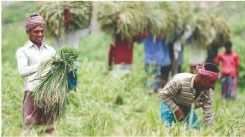 Bangladesh's rich tradition of indigenous farming practices, such as intercropping and floating agriculture, plays a critical role in sustainability, food security, and biodiversity conserva- tion. By integrating these traditional practices with modern technologies like precision agriculture and biotechnology, Bangladesh is shaping a future where sustainable agribusi- ness growth coexists with high-tech advancements. ACI's efforts in seed development, mechanization, and agro-pro- cessing exemplify how technology can enhance agricultural productivity and profitability, positioning Bangladesh as a leader in both traditional and modern agricultural practices.
Bangladesh's rich tradition of indigenous farming practices, such as intercropping and floating agriculture, plays a critical role in sustainability, food security, and biodiversity conserva- tion. By integrating these traditional practices with modern technologies like precision agriculture and biotechnology, Bangladesh is shaping a future where sustainable agribusi- ness growth coexists with high-tech advancements. ACI's efforts in seed development, mechanization, and agro-pro- cessing exemplify how technology can enhance agricultural productivity and profitability, positioning Bangladesh as a leader in both traditional and modern agricultural practices.
Indigenous Farming Practices: Sustainability and Historical Significance
Indigenous farming practices in Bangladesh, rooted in centuries of tradition, exemplify sustainability, resilience, and a deep understanding of local ecosystems. Key methods like intercropping, mixed cropping, floating agriculture, Jhum cultivation, seed saving, and homestead gardening optimize resource use, enhance biodiversity, and ensure food security while supporting smallholder farmers. These techniques reflect a harmonious relationship between humans and nature, preserving biodiversity and cultural heritage. By integrating indigenous knowledge with modern technologies, Bangladesh can address climate challenges, resource constraints, and food demands, paving the way for a sustainable and resilient agricultural future that honors its historical legacy.

Innovative Technology in Agribusiness
Innovative approaches in agribusiness are revolutionizing the sector by enhancing productivity, sustainability, and profitability through technology and modern practices. Precision agriculture uses tools like GPS, IoT, and drones to optimize farming, while sustainable methods like regenerative agriculture and agroforestry improve soil health and biodiversity. Biotechnology advances, such as GM crops and CRISPR, develop resilient, high-yield crops, and urban agriculture maximizes food production in limited spaces. Agri-Fintech solutions, smart supply chains, and farm management software empower farmers with financial access, transparency, and data-driven decision-making. Alternative protein sources and water management technologies address environmental challenges, while consumer-driven models like farm-to-table and agro-tourism connect farmers directly to markets and diversify income. These innovations collectively tackle food security and climate change, shaping a sustainable and efficient agricultural future.
Technology: The Catalyst for Transformation
Bangladesh is pioneering agribusiness transformation by integrating traditional farming with modern technologies. Some of the notable successes are as follows:
Seed and Crop Innovations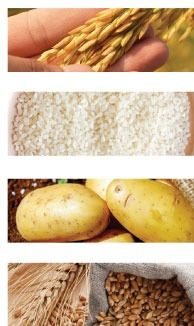
•Developed High Yielding Hybrid Rice variety: ACI Seed's development of high-yielding hybrid rice varieties, such as those with 11+ MT/ha yield potential, is a prime example of combining traditional farming practices with cutting-edge genetics and technology. This innovation addresses food security and enhances productivity.
• Aromatic Rice Development: ACI's breakthrough in small-grain aromat- ic rice, with yields of up to 7 MT/ha compared to traditional varieties, demon- strates how modern breeding techniques can enhance traditional crop value, meeting local demand for premium rice while improving yield. Also developed and commercialized high yielding, short duration variety for Aman and Boro season.
• Potato Research and Processing: ACI's work on next generation modern potato varieties, such as the Valencia, designed for processing into french fries and chips, shows how innovative breeding can serve both domestic and international markets. Additionally, this variety can be grown year as the variety generate 28-30MT/ yield within 60 days due to its early bulking capacity. This also ties traditional potato farming with agritech solutions for industrial uses.
• High Gluten Rich Wheat Variety Released: Industrial use purpose we need to import high gluten content wheat mostly from Ukraine, India and Russia. Now, we explore locally as ACI has released two wheat varieties having almost double yield capacity with over 32% gluten content.
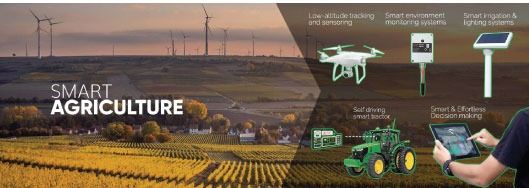
Mechanization and Automation
• Yanmar yield sensor harvester and Smart Assist Remote (SAR) system can be improved paddy yield by 30% to 40%. This yield sensor can sense and make a yield mapping during harvesting of paddy of a certain land. From where we can easily identify the yield variance due to shortage of fertilizers. These data will be stored in the server, from where intelligent drone can take data and fertilize and apply the required nutrition to improve the yield of the same piece of land in next season.
• Smart Irrigation, Solar-powered, loT-enabled irrigation systems optimize water use, reducing waste and labor costs while maintaining traditional irrigation practices. Automatic Watering and Subsurface Drip Irrigation (SDI) allows farmers to control when and how much water their crops can take. By leveraging technology, these systems reduce water waste and labor costs, while maintaining the traditional reliance on irrigation in Bangladesh's agricultural practices.
• Drone Technology, using farmers will receive the foresights on the plant health indices, plant counting and yield prediction, plant height measurement, nitrogen content in wheat, drainage mapping, weed pressure mapping, and so on. Drones are used for precise crop monitoring, irrigation assessment, and pesticide application, complementing traditional farming practices with accurate data.
• Automatic Planting and Seeding machines or robots come with geomapping and sensor data. This data consists of soil quality, density, moisture, and nutrient levels so that the seeds can grow in a health environment. The global planting machines market size will grow from USD 51.12 Bill with CAGR of 8.1%
• Automatic Fish Feeder, Aerators, Soil moisture and pH tester and digital microscope farmers can save about 15-20% feed loss/wastage, improving dissolved oxygen content in adverse conditions, measuring bottom soil specifi- cations and finally diagnosing numerous anomalies in Aquaculture ponds.
• Bangladesh is one of the largest exporters of frozen shrimps and prawns in the world. Introduction of Venna Mei shrimp culture in Bangladesh which will boost the productivity of the shrimp farmer by several folds (from 300KG/Ha to 9000KG/Ha) and also significantly improve the shrimp export to the world.
• Mastitis detector machines are frequently used in dairy farms for detecting sub clinical mastitis and reducing the risk of Clinical Mastitis after calving and saving 60% of treatment cost of mastitis and also adding average 2 litre additional milk.
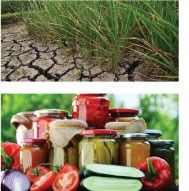 Sustainable Solutions
Sustainable Solutions
• Climate-Resilient Varieties: the development of drought, submergence, saline tolerant rice varieties in response to Bangladesh's frequent weather extremes. Using advanced breeding techniques, these varieties help farmers maintain productivity despite climate challenges, combining traditional knowledge of local conditions with modern agronomy
• Agro-Processing and Value Addition: Modern processing facilities for dried fruits, juices, and vegetables add value to traditional crops, support- ing local and export markets. The integration of modern processing facilities for products like dried fruits, juices, and preserved vegetables has increased the value of traditional crops. By adopting food processing technology, farmers are able to capture more value from their produce, transitioning from raw to processed products for both local and export markets.
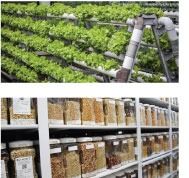 Sustainable Solutions
Sustainable Solutions
• Vertical and Urban Farming, urban farming initiatives using hydroponics and vertical farming techniques are emerging in Dhaka and other cities. These innovations allow farmers to grow vegetables and fruits in limited space, addressing land scarcity issues while maintaining traditional farming techniques for local consumption.
• Seed Banks and Genetic Preservation, the establishment of seed banks to preserve native varieties of rice and vegetables. These seed banks combine modern agricultural science with traditional crop preservation methods, ensuring the conservation of local biodiversity while allowing farmers to access improved, climate-resilient varieties.
Digital Solutions
• Precision Agriculture, Precision agriculture uses data analytics, GPS technology, and loT devices to optimize farming practices. Drones monitor crop health, while sensors track soil moisture, enabling farmers to make data-driven decisions that conserve resources and boost productivity. found that precision agriculture could reduce water usage by 30% while increasing yields by 10 -15%. This technology bridges traditional farming knowledge with real-time data, boosting both efficiency and profitability
• E-Agriculture Platforms, E-agriculture platforms like "Fosholi" connect farmers with agricultural experts, suppliers, and markets, fostering knowledge sharing and increasing access to inputs. This online community helps integrate traditional farming knowledge with technological solutions, empowering farmers to make informed decisions.
Empowering farmers with digital tools enhances decision-making, profitability, and access to markets, while scientific validation scales traditional practices for broader use. Integrating these approaches promotes inclusivity, resilience, and food security, preserving cultural heritage and unlocking niche markets for products like heritage grains, driving both economic and cultural sustainability.
Integrating indigenous wisdom with modern innovation offers transformative solutions to environmental challenges. By uniting ecological insights with advanced tools, we can protect nature, empower communities, and pave the way for a resilient future.
These innovations reflect the seamless blend of traditional farming practices and modern technologies driving sustainable agribusiness growth in Bangladesh. ACI's efforts in crop breeding, mechanization, precision agricul- ture, and digital solutions help enhance productivity, sustainability, and profitability in agriculture. By combining climate-resilient varieties, modern processing techniques, and cutting-edge automation, Bangladesh is position- ing itself as a leader in both traditional and technological farming practices.

Integrating Traditional Practices with Modern Technologies for Sustainable Agriculture
Blending traditional agricultural practices with modern technologies offers a transformative approach to sustainability. Indigenous crop cultivation preserves biodiversity and, when paired with advanced breeding, enhances yields. Eco-friendly methods like intercropping and organic farming become more effective with precision tools, reducing chemical use and improving soil health. Traditional knowledge addresses climate challenges with localized solutions, such as drought-tolerant crops, which can be amplified by resilient seed varieties and early warning systems. Produc- tivity gaps in traditional systems can be bridged using modern technologies like high-yield seeds and efficient irrigation, optimizing resources without overexploitation.
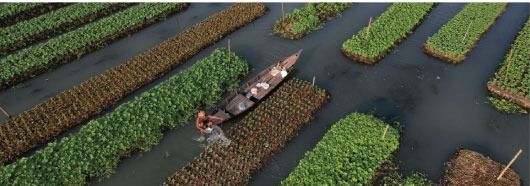
Challenges must be addressed to successfully adopt innovative agriculture technologies in Bangladesh:
• Access to Funding: Securing financial support is essential to enable the adoption of innovative agriculture technolo- gies and practices.
• Resistance to New Technology: Farmers' reluctance to adopt new technologies, often due to lack of knowledge, access to training, or trust in modern methods, slows down the integration of innovations.
• Climate and Environmental Challenges: Unpredictable weather patterns, flooding, and soil degradation create obstacles for both traditional and modern agricultural practices, making it harder to achieve sustainable solutions.
• Awareness Gaps: Many farmers lack knowledge about the potential benefits of innovative agriculture technologies.
• Limited Infrastructure: R&D infrastructure including land, seed processing and quality control, packing automation, post-harvest and transportation infrastructure are often inadequate.
• Technical Expertise: Adoption requires a certain level of technical know-how, which may be limited in rural areas.
• Socioeconomic Barriers: Factors like attitudes toward technology, gender norms, and access to education and training influence slow adoption rate.
• Fragmented Land for Cultivation: Small, fragmented land holdings make it difficult to implement large-scale modern agricultural practices and technologies, hindering efficiency and productivity.
Beyond climate change, agriculture grapples with pressing challenges such as floods, droughts, extreme heat, sudden heavy rains, flash floods, riverbank erosion, shrinking arable land, declining soil fertility, and rising salinity. The FAO forecasts a 3-5% decrease in global cereal yields for each 1°C increase in temperature, intensifying these issues. In Bangladesh, these challenges are compounded by rapid urbanization, industrialization, and extensive riverbank erosion, further reducing cultivable land. Salinity, a significant barrier to productivity, underscores the urgency of addressing these threats to safeguard the country's agricultural future.

Opportunity for GrowthT
o improve the adoption of innovative agriculture technologies in Bangladesh, the following measures are critical:
• Financial Incentives: Subsidies, tax breaks, and low-cost, long-term funding through initiatives
• Investment in Innovation: Supporting research and development to identify and advance context-specific smart agriculture technologies.
•Infrastructure Development: Improving R&D infrastructure, seed storage, processing, quality control, and transportation to enable technology adoption.
•Training and Capacity Building: Offering programs to enhance farmers' technical expertise and that of other stakeholders.
• Collaborative Partnerships: Encouraging synergy between government agencies, private sector players, donor agencies to drive innovation and scalability.
• Technology and Innovation: Advancing drought-resistant crops, climate-smart technologies, and developing export-quality varieties will boost productivity and open new international markets.
• Market Linkages: Contract farming and improved market access will boost incomes, reduce post-harvest losses, and facilitate entry into export markets.
• Digital Tools: Digital platforms offering weather alerts and price forecasts will empower farmers to make informed decisions and improve market positioning.

Transforming Agribusiness Through Innovation and Strategic Investments
ACI, a leading agriculture company, operates across the entire agricultural value chain, spanning field crops, vegetables, fisheries, poultry, dairy, and cattle, with a robust domestic and growing international presence. ACI is transforming agribusiness through innovation and strategic investments in key areas, including research and development (R&D) for molecular breeding, climate-smart crop solutions, improved inputs and practices, digital connectivity, post-harvest infrastructure, value-added food processing, and forward linkages. These initiatives are driving growth, sustainability, and global competitiveness, positioning ACI as a leader in the evolving agribusiness sector.
Conclusion
Bangladesh's agribusiness sector stands at a critical juncture, with vast opportunities for innovation and moderniza- tion. By integrating traditional agricultural wisdom with cutting-edge technologies, the country can address challenges like climate change, resource constraints, and food security while enhancing productivity and sustainability. ACI's work in crop variety development, mechanization, and agro-processing demonstrates how technology and traditional practices can coexist to foster growth. Continued investment in research and development, along with improved infrastructure and digital tools, will unlock Bangladesh's potential as a global agribusiness leader. By embracing a collaborative approach involving the government, private sector, Bangladesh can navigate these hurdles and unlock its full agribusiness potential.24 Foreign Investors' Chamber of Commerce and Industry





